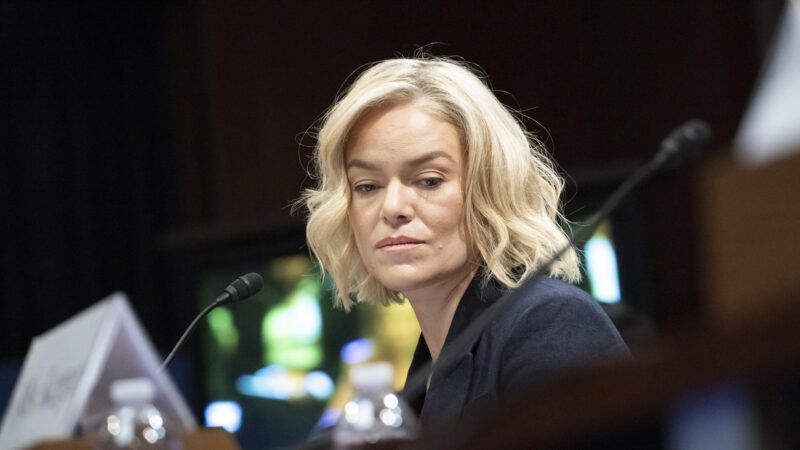The Senate Was Right To Defund NPR and PBS
This was not an attack on the free press.

The Senate has voted to cancel $1.1 billion in public funding for NPR and PBS, a move described as "an unusual surrender of congressional spending power" by The New York Times, though the only thing particularly unusual here is the federal government deciding not to spend money.
NPR CEO Katherine Maher has fought this outcome tooth and nail. During an appearance on CNN, she made the case that public radio was a vital source of information in rural areas that lack adequate cellphone service and internet access.
"There's a real understanding of the need there, as well as for emergency alerting, in which public media plays an extraordinarily important role," she said.
NPR CEO Katherine Maher argues rural America often has no other possible source of news or connection to the outside world EXCEPT through PBS and NPR: "Large rural communities, large tribal communities" don't have "a lot of other options. Broadband service is not universal, and… pic.twitter.com/OFWuQTCa2E
— Curtis Houck (@CurtisHouck) July 16, 2025
This argument is hard to take seriously. While it's true that there are places in the U.S. that don't have reliable internet access, it does not follow that federally subsidizing an outmoded means of distributing information is the answer. If the government is going to do something about a lack of connection, it should spend more money on building infrastructure or clearing the way for private interests to provide the services that people need. If they value it, they will pay for it. And during an age in which Elon Musk's Starlink can use satellites to provide high-speed internet to war-torn Ukraine, the idea that the U.S. government should continue to pay for a specific editorial product because it's the best way to transmit emergency information strains credulity.
Unsurprisingly, mainstream media voices are already describing this vote as part and parcel of the Trump administration's attack on a free press. To be sure, President Donald Trump has undermined press freedom in numerous ways: He has sued media organizations over their editorial choices, and his Federal Communications Commission (FCC) has threatened to remove the broadcast licenses of channels that criticized him. Both Republican and Democratic members of Congress routinely browbeat media companies for speech-related reasons—a practice known as jawboning, which violates the spirit of the First Amendment if not its literal text.
But defunding NPR does not constitute censorship of NPR. On the contrary, forcing taxpayers to subsidize it represents a kind of compelled speech. NPR should be free to make its own editorial choices—even ones that are pathologically unfriendly to Trump—and Americans should be free to choose whether they want to pay for it.
This Week on Free Media
I'm joined by Amber Duke to discuss Andrew Cuomo's shameless quest for New York City's mayor's office, Tucker Carlson's conviction that Jeffrey Epstein was an intelligence asset, Andrew Schulz's frustrations with Trump, and much more.
Worth Watching
I am delighted by the Legend of Zelda movie casting news!
This is Miyamoto. I am pleased to announce that for the live-action film of The Legend of Zelda, Zelda will be played by Bo Bragason-san, and Link by Benjamin Evan Ainsworth-san. I am very much looking forward to seeing both of them on the big screen. (1/2) pic.twitter.com/KA5XW3lwul
— 任天堂株式会社 (@Nintendo) July 16, 2025
It seems that Nintendo heeded my advice and chose age-appropriate, relatively unknown actors to play Link and Zelda instead of, say, Tom Holland and Zendaya. This was the right move. Someone like Tom Holland, who is already a star in his own right, would have overshadowed the character; it takes a certain amount of subtlety and obscurity to play Link, who famously does not speak in the source material. Same goes for Princess Zelda, who is best when underused: The mystical nature of the character is effectively preserved by having her off-screen some of the time.
The next big task is the script. I would encourage Nintendo to hire me to write it. My script would loosely adapt Ocarina of Time with some elements from Skyward Sword, and set up for a trilogy of films—with adaptations of Majora's Mask and Twilight Princess to follow. My movie goes like this: In the past, Zelda uses the Ocarina of Time to transport herself and Ganon (in monster form) a thousand years into the future, granting Hyrule centuries of freedom from the king of evil. In the present, Link must prepare for Ganon's impending arrival by acquiring the Master Sword and clearing out the sage's temples, while also traveling seven years into the future (and back) to confront Ganondorf after his minions—Koume, Kotake, and Girahim!—revive him in human form following Ganon's destruction. Seriously, Nintendo: Call me.


Show Comments (86)